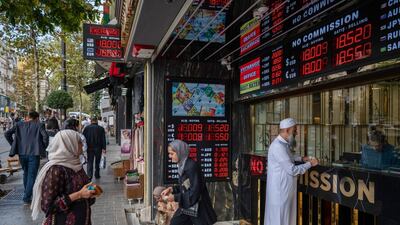Turkey’s central bank made another shock cut to interest rates, despite inflation running at a 24-year high and with the lira trading at a record low.
The Monetary Policy Committee led by Governor Sahap Kavcioglu lowered the benchmark to 12 per cent from 13 per cent on Thursday. The lira extended declines after the decision and hit a fresh low against the US dollar.
It was trading 0.3 per cent weaker against the dollar at 3.04pm UAE time.
Most economists surveyed by Bloomberg had predicted no change after an unexpected 100-basis point cut in August that ended a seven-month pause. A minority that included Morgan Stanley, UniCredit and Citigroup had forecast a cut.
In a statement accompanying its decision, the MPC said there was a “loss of momentum in economic activity due to decreasing foreign demand”.
President Recep Tayyip Erdogan and his ally Mr Kavcioglu are sticking to an unorthodox playbook that resists rate increases to contain inflation. The approach has encouraged economic growth at the expense of price stability and left Turkish assets more vulnerable to sell-offs. As a result, annual inflation has shot past 80 per cent, while the lira is among this year’s worst performers in emerging markets.
“Turkey is now entering election economics,” said Tugberk Citilci, head of research at Istanbul-based InvestAZ Menkul Degerler, who expected the 100 bps cut.
Explaining its decision to lower rates last month, the MPC said it was responding to a loss of economic momentum and did not plan to embark on a new easing cycle, saying “the updated level of the policy rate is adequate under the current outlook”.
For many economists, the messaging had suggested no additional rate cut was likely until later.
Mr Kavcioglu, in a blog post last week, repeated that macroprudential measures and policies aimed at widening the use of the lira would be used to achieve price stability. He’s the fourth central bank governor since 2019 after Mr Erdogan fired three predecessors.
The central bank, which says it remains committed to its 5 per cent inflation target, repeatedly cut rates under Mr Kavcioglu’s leadership late last year, when annual price increases were already running in double digits.

